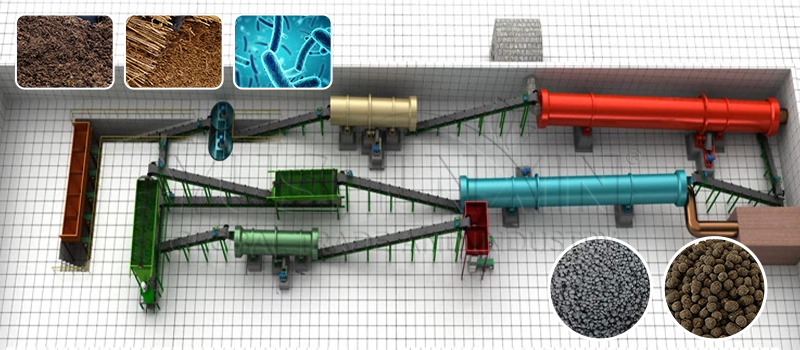1. Why Compost Alone Isn’t Enough
Many farmers already make compost from animal manure, crop residues, or food waste. Composting reduces odors, kills pathogens, and stabilizes nutrients — but compost alone doesn’t always meet crop nutrient needs. Its nutrient content is inconsistent, and it releases nutrients slowly.
That’s why more producers are upgrading their compost into bio organic fertilizer, combining composted materials with microbial inoculants or NPK additives to create a balanced and more efficient fertilizer product.
2. Main Raw Materials for Bio Organic Fertilizer Making
The foundation of bio organic compost fertilizer comes from agricultural and livestock waste — such as cow dung, chicken manure, mushroom residue, and crop straw.
To make it suitable for granulation or liquid application, the composted material is often mixed with:
- Beneficial microbes like Bacillus, Rhizobium, or phosphate-solubilizing bacteria.
- Supplemental nutrients, including nitrogen, phosphorus, and potassium.
- Moisture control materials, such as peat or sawdust, for better texture.
These combinations transform simple compost into a nutrient-rich, microbe-active organic biofertilizer that enhances soil health and plant growth. Click here to get more!
3. Compost to Biofertilizer Processing Steps
The typical compost-to-biofertilizer conversion process includes:
- Fermentation – composting the raw waste until it becomes stable and mature.
- Crushing and Screening – refining the compost particles to uniform size.
- Mixing and Microbial Addition – introducing beneficial microorganisms and nutrients.
- Granulation or Drying – depending on the final product form (powder or granule).
- Packaging and Storage – sealing the finished bio organic compost fertilizer for sale or use.
Each stage can be supported by specialized equipment — such as compost turners, horizontal mixers, and granulators — to improve efficiency and product quality.

4. Things Farmers Care About Most
When converting compost into bio organic fertilizer, most investors focus on:
- Moisture and temperature control, which affect microbial activity.
- Selection of microbial agents, depending on the desired fertilizer effect.
- Production scale and cost, usually ranging from small farm setups to large industrial lines.
At YUSHUNXIN, we’ve designed various compost-to-biofertilizer production systems, suitable for both small and large operations. Our solutions help balance equipment investment and production stability, allowing users to turn organic waste into marketable fertilizer efficiently.
Conclusion
Transforming compost into bio organic fertilizer is more than recycling — it’s an upgrade in nutrient management and sustainability. With the right formulation, processing technology, and reliable equipment, producers can turn ordinary compost into a consistent, high-quality biofertilizer ready for modern agriculture. If you need a business plan, welcome to visit: https://www.biofertilizerproduction.com/product/bio-organic-fertilizer-production-line/
No Responses